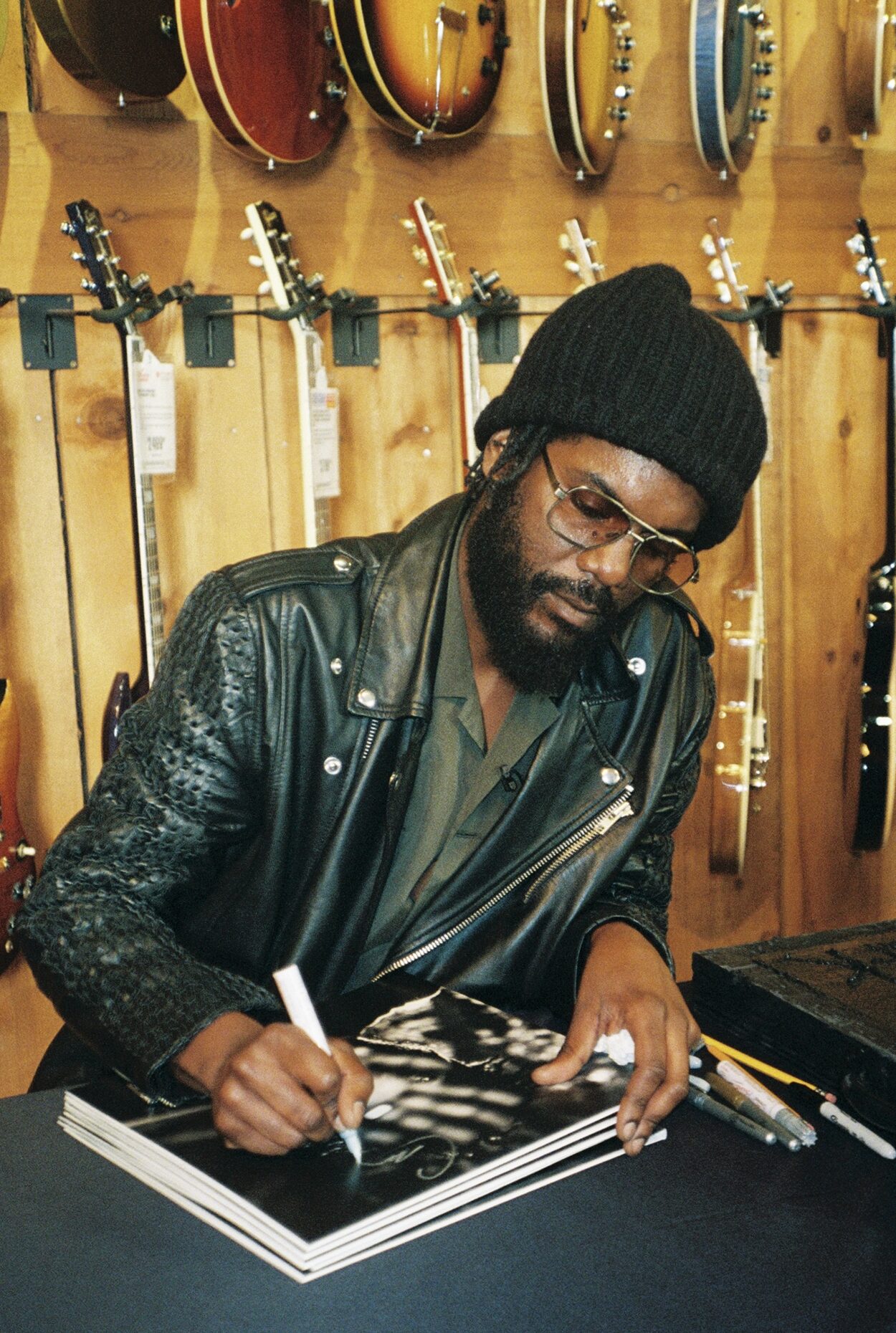Four-time Grammy-winning guitarist, songwriter, and performer Gary Clark Jr. was hailed a mighty honor this week, earning a plaque on Guitar Center’s RockWalk in Hollywood, California.
The accomplishment comes accompanied by many greats, including the likes of Eric Clapton, Carlos Santana, AC/DC, Aerosmith, Marvin Gaye, James Brown, B.B. King, Stevie Wonder, Run-D.M.C., and Queen, amongst countless others.
It’s no surprise to see Gary Clark Jr. finding himself next in the lineup, as his eclectic catalog fuses R&B, soul, rock, hip-hop, and jazz to alchemize something sonically spiritual. Making fans out of idols like Stevie Wonder and George Clinton, Gary Clark Jr. is both lightyears ahead and the embodiment of a rich lineage. To have those you’ve admired at eye level, seeing within you what you’ve been brave enough to see within yourself, is the true mark of a timeless artist.
His latest project JPEG RAW digs deep beneath the skin, a vibrant confrontation of a paralyzing pandemic and his experience within isolation. While its themes may be heavy, his immersive instrumentation and colorful array of sonics certainly soften the blow. It’s also worth noting that the talented musician’s magic far extends his own catalog: he’s credited on Beyonce’s revolutionary Cowboy Carter album, offering guitar on “Protector,” “Daughter,” “Desert Eagle,” and “II Hands II Heaven.”
Blavity quickly caught up with the multidisciplinary at his induction to talk purpose after parenthood, making art that’s timeless, and of course, Cowboy Carter.

In light of today’s honor, is there a specific guitar that’s found you along your journey that’s most significant to you?
Gary Clark Jr.: The guitar I got in 1997. My parents got it for me and it’s the only guitar I’ll ever need in my whole life. 100 guitars later and I still play that guitar. It just sounds better than any other one, I keep going back to it. It’s sentimental, stuck with me for many years.
Speaking of your parents, I’d love to know what you were hearing in the backseat of their car growing up that awakened you creatively and invited you to be so fluid musically.
GC: Curtis Mayfield, Stevie Wonder, Prince. Anything Motown. A lot of pop music, Michael and Janet Jackson. DeBarge. All of that was their choice, but every now and then we’d listen to the radio and hear En Vogue, Mariah Carey, Boyz II Men. Mostly R&B music, but my dad loved smooth jazz so I heard a lot of Kenny G, too.
Do you keep them current with the music that’s coming out now?
GC: My pops is everywhere man, I don’t know how he knows about everything. He’ll be at the Schoolboy Q show, Jon Batiste, Little Dragon, he’s in the know. He kind of has to keep me on point.
Within that, what’s your perspective on how social media has shaped the way that we consume music? Do you find yourself ever getting lost in it or do you think it’s expanding us?
GC: I think TikTok in particular is used to build momentum within moments, but we can get so distracted by another moment and then the song just becomes a soundtrack for that moment. We don’t necessarily absorb something as art. It’s giving attention to the artist, so that’s on the artist to make something out of. I’m new to this and I’m a little slow when it comes to keeping up with that stuff but I’m trying to be better.
I feel like that speaks to the importance of longevity. What do you think it takes for a body of music to be timeless?
GC: Oof, wow. I was thinking maybe it’s sonics, using certain instruments could make it sound dated. But I think it just had to do with the lyric and the melody. Does it make you feel something? When you sing it back out loud, does it make you feel something?

You contributed to several songs on Beyoncé’s Cowboy Carter and I’d love to know your experience being a part of a project that’s catalyzed such a crucial dialogue around the confinement of genre and Black influence.
GC: Cowboy Carter was a genius way to shock the system. We do this and we’ve been doing this forever. Beyoncé can do anything and I think it was great how she pulled people from the country, blues, and gospel realm and took it to a new level. I mean, she got endorsements from Dolly Parton and Willy Nelson, that’s Texas right there. Those are my people. It was great to be a part of it. It’s so special how it’s shaking up the industry, platforming artists that maybe would have taken a little bit longer to get a shot. We’re out here. But that’s her intention, she knows that when she releases anything it’s going to make an impact culturally.
Lastly, you are someone who is so rich in accolades. Having the Grammys, endorsements from icons, and most importantly your own family, has your “why” changed?
GC: That’s a great question. Yes. At this point, I’m in a place where I’ve got everything I need. I don’t have to worry about keeping the lights on. My babies are fed and educated. My wife is taken care of, she takes care of herself, she takes care of us. My only goal is to keep this going as long as possible because I love it and have people I’m inspired to work hard for. These babies gotta eat. Before it was about me, about being an artist and exploring my creative possibilities. Now, it’s a job. But it’s an amazing job.

